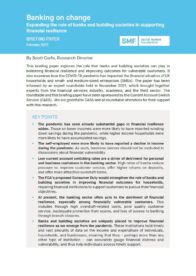This briefing paper explores the role that banks and building societies can play in bolstering financial resilience and improving outcomes for vulnerable customers. It calls for financial institutions to be made to compete with each other on providing quality financial wellbeing services, and ultimately empower customers.
The pandemic has seen already substantial gaps in financial resilience widen. Those on lower incomes were more likely to have reported winding down savings during the pandemic, while higher income households were more likely to have accumulated savings. Additionally, at present, the banking sector often acts to the detriment of financial resilience, especially among financially vulnerable customers.
Banks and building societies are uniquely placed to improve financial resilience as we emerge from the pandemic. These institutions hold timely and vast amounts of data meaning that they – perhaps more than any other type of institution – can accurately gauge financial distress and vulnerability, and thus help individuals access timely support. However, low switching rates are a driver of detriment for personal and business customers in the banking sector as they reduce pressure to: improve customer service, offer higher returns on deposits, and offer more attractive overdraft terms.
We recommend that increasing consumer consideration to choose a new current account, and higher switching rates would improve financial outcomes for customers, but cannot be seen as a silver bullet. Regulatory measures are essential for protecting financially vulnerable customers and setting out the duties and obligations of banks and building societies to their customers.
RECOMMENDATIONS
For policymakers
- A “prompting” mechanism should be introduced in the current account space, with banks required to prompt customers every two years about their current account
- Financial resilience partnerships and social prescribing should be used to reduce the burden of financial vulnerability on the NHS. Financial difficulties can have a detrimental impact on individuals’ mental health. New financial resilience partnerships should be formed, bringing the NHS, financial institutions, and third sector together to discuss joint approaches to supporting the financially vulnerable. This should include social prescribing of financial wellbeing tools by GPs.
For banks and building societies:
- Financial institutions should be actively competing with each other to offer best-in-class financial wellbeing services. This includes apps and tools providing spending plans, forecasted cash flows, automatic saving functions, and expenses categorisation. These tools could be particularly valuable for encouraging financially vulnerable customers to engage with banking services. Competition in the financial wellbeing space may also be increasingly important, given the persistence of the low interest rate environment which limits the ability of banks to compete on financial returns on deposits. A shift away from free-if-in-credit (FIIC) banking in the future, with most/all banks charging for current account access, could also lead to increased competition over the provision of such “value added” services.
- Financial institutions need to continue to do more to empower customers to share their vulnerabilities (e.g. a mental health issues or abuse from a spouse or partner), allowing banks and building societies to provide tailored support. This includes thinking more about how to assist customers that are not aware of their vulnerabilities – for example someone that is not conscious that they have an issue with compulsive gambling. There is scope for firms to be more proactive, informing individuals about concerning spending patterns.


